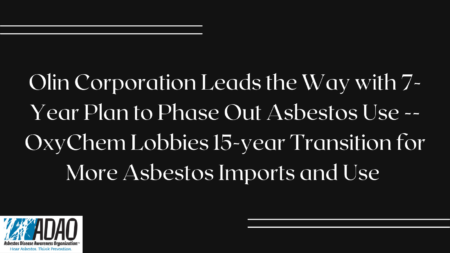Posted on April 1, 2023

Each year, asbestos exposure claims the lives of over 40,000 Americans. Despite this deadly substance’s known harms and dangers, companies continue to import and use it. However, there is a glimmer of hope. On April 4th, 2022, the Olin Corporation announced a 7-year plan to phase out all asbestos use in their facilities and also stated that no further asbestos imports would occur. This decision is a significant step towards protecting public health and preventing further asbestos exposure and sets a precedent that other chlor-alkali companies can and should follow.
In an interview with InsideTSCA, Olin CEO Scott Sutton criticized other industry groups’ call for a 15-year phase-out. He also strongly supported a ban, saying, “As the largest global and US producer of chlor-alkali, and as the owner of the largest global and US asbestos-based diaphragm chloralkali capacity, Olin Corporation would support an EPA action to ban the installation of any new or replacement asbestos-based diaphragms in two years, in combination with an additional five years to operate any existing asbestos-based diaphragm production cells.”
The Asbestos Disease Awareness Organization (ADAO) has been tirelessly advocating for a complete ban on asbestos imports and use and has been tracking the usage of asbestos by corporations. According to ADAO’s research and available public documents, Westlake Corporation stopped importing asbestos in late 2016, and Olin Corporation stopped importing asbestos in March 2021. As of April 2023, OxyChem, or Occidental Chemical, remains the only chlor-alkali company importing and using raw chrysotile asbestos in five of its plants located in Kansas, Louisiana, and Texas.
This is where the Alan Reinstein Ban Asbestos Now (ARBAN) Act of 2023 comes into play. ARBAN, a comprehensive asbestos ban, will ban all asbestos fibers and the Libby Amphibole in all uses, unlike the Environmental Protection Agency (EPA) Part 1 Chrysotile Asbestos proposed final rule that bans one fiber in six conditions of use.
One of the greatest challenges in transitioning away from asbestos use is the time required to switch to non-asbestos technology. Fortunately, an estimated 80% of U.S. chlor-alkali plants now use superior non-asbestos technology, which offers environmental and economic advantages over asbestos diaphragms. The ARBAN Act recognizes this challenge and provides a generous timeline for industry’s transition to non-asbestos technology.
While the Olin Corporation’s decision to phase out asbestos use over the next 7 years is praiseworthy, there is still much work to be done. OxyChem’s continued use of asbestos serves as a reminder that the fight for a comprehensive ban on asbestos imports and use is far from over. Regulations proposed by the EPA will be easily challenged in court, elongating this process. ADAO hopes the remaining two corporations who continue to use asbestos, OxyChem and Westlake, will follow Olin’s leadership and make the same public commitment to transition from asbestos technology and immediately stop importing raw asbestos into the United States.
Olin’s 7-year plan to phase out asbestos use is a step in the right direction towards protecting public health; however, our efforts to ban asbestos imports and use must continue. The ARBAN Act of 2023 is a crucial piece of legislation that will help achieve this goal. We need all Americans to be informed about the dangers of asbestos and support efforts to protect workers and communities from dangerous asbestos exposure. We need an all-out ban, and we need it now.
Linda Reinstein
Social Networks
